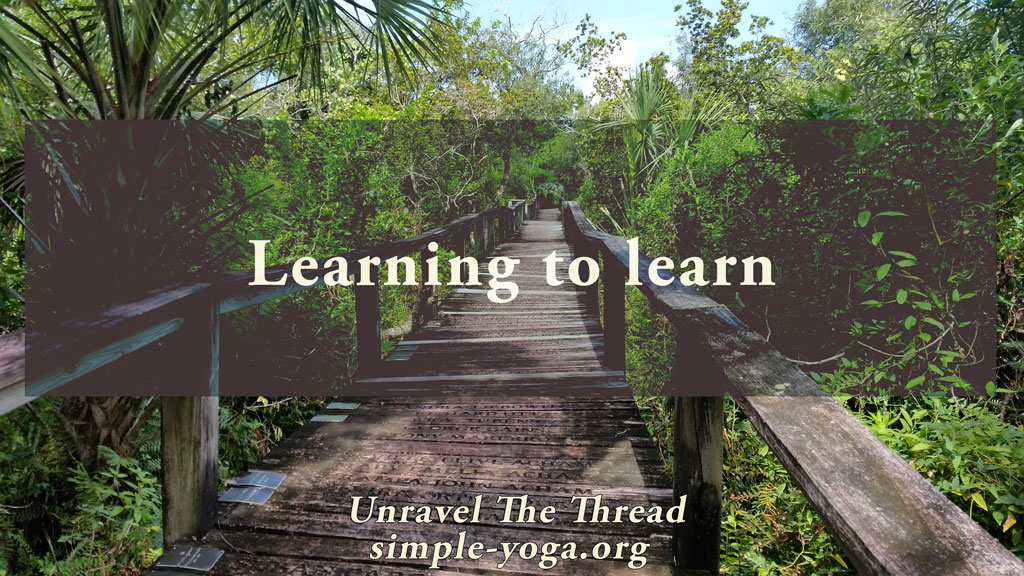
Learning to learn
May 1, 2023
Validate – being with what is
July 24, 2023
Learning to learn
May 1, 2023
Validate – being with what is
July 24, 2023Are you a follower?

Are you a follower?
As we commit to our wholehearted participation in the world by making each moment the most important moment of our lives and by having decided if the world is a friendly or hostile place, we continue on our path of growing in presence by being our own best friends, letting go of unnecessary resistance and by clarifying what we know and how we know it.
Hopefully it is clear that in order to grow, we will go through feeling tolerable discomfort that confirms that we are moving beyond the limits of our understanding. We need to make sure that what we are learning contributes to enhancing the quality of our life. How do we test this? What we learn helps us improve the quality of our participation in every moment and every interaction. Of course, even more simply, whatever we are learning passes the test of common sense.
Precisely because all meaningful learning will cause us tolerable discomfort, it is helpful to have well-intentioned and trustworthy guidance in our learning process. Part of the learning process involves recognizing if the teacher is trustworthy and well-intentioned. The other part is testing the teaching to ensure that it is applicable and useful for us at the time.
As we reflect on useful guidance, it is helpful to consider that every person invested in a particular position is interested in persuading others to adopt their perspective. There are numerous persuasion tactics, the most effective tailored to the target audience. This is nothing new. What may be different nowadays is the speed of communication, the amount of data gathered about each person in the target audience and the volume of communications that can be generated. In recent years we have seen large companies dedicate numerous resources to identifying trends, influencers, and ways of increasing the number of their followers. Unfortunately, history shows that in many realms of society some people with power and influence use their power and influence to manipulate others in order to increase their influence and wealth. Although some of us would prefer to be able to trust our teachers because they belong to a certain group, or because they hold a specific title, there are countless examples of teachers in high positions of power taking advantage of their students and followers. This does not mean that there are no trustworthy teachers. It only suggests that it is intelligent to make sure that we observe teachers and examine their teachings carefully. This is especially true if we consider that it is usually the student who may be put in a vulnerable position.
Assessing if our teachers are well-intentioned requires that we recognize how our biases and peer pressure may be influencing some of our perceptions, thoughts, and behaviors. Let’s remember that teachers are humans, they are also in a process of expanding their awareness. Maybe they are judicious in their own process of learning and growth. By paying attention to the teacher, their actions and the coherence between their actions and their words, we will probably learn some important lessons, some to be emulated and some as warnings as to what not to do.
Some useful questions: Is my teacher a living example of what they profess? What specific actions show me that my teacher is trustworthy? Regardless of how much you trust your teacher, remember that you are the only person in charge of making your own decisions. First, because you, especially if you have been uncovering your areas of weakness and unconscious tendencies, are an expert on you and your life. Second, you are the most invested in your well-being. And third, because you will live with the consequences of your choices.
The importance of establishing meaningful connections to others, including with our teachers, is undeniable. I invite you to consider if it may be more intelligent to follow the teachings, rather than to follow a teacher. Making this choice empowers you to be in charge of your own process of learning and growth and it gives you the responsibility of testing the teachings you receive. Then you can make a conscious decision to adopt the teachings for as long as they enhance the quality of your life and of your ways of interacting with others and participating in the world. As usual, it is completely up to you, would you rather follow a teacher or a teaching?
If you prefer, you may listen to the podcast:
This is an excerpt from the book Unravel the thread: Applying the ancient wisdom of yoga to live a happy life
If you find Simple-Yoga.org and Unravel the thread useful, consider supporting my labor with a donation, you may also donate using PayPal or Venmo. Thank you!
